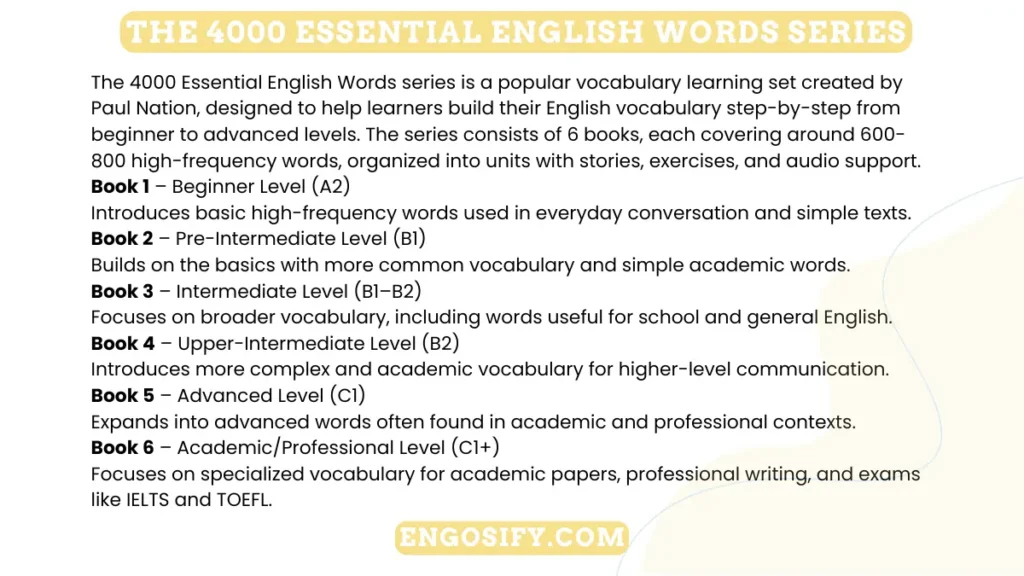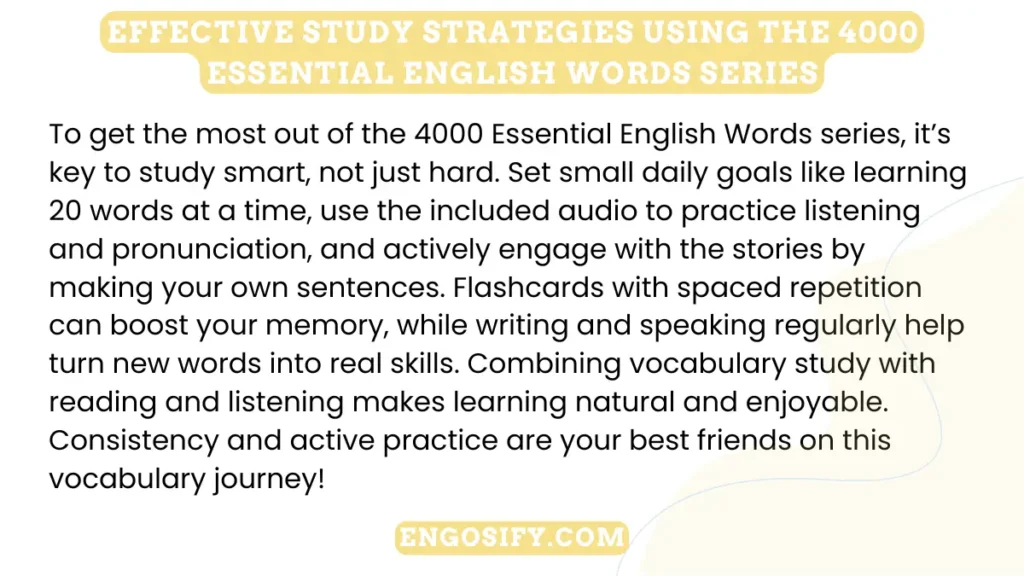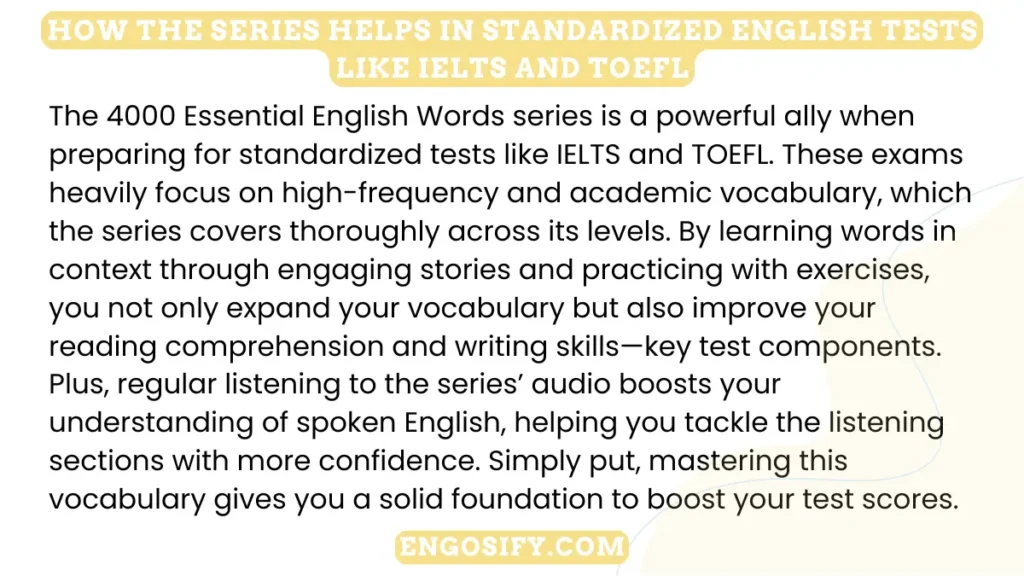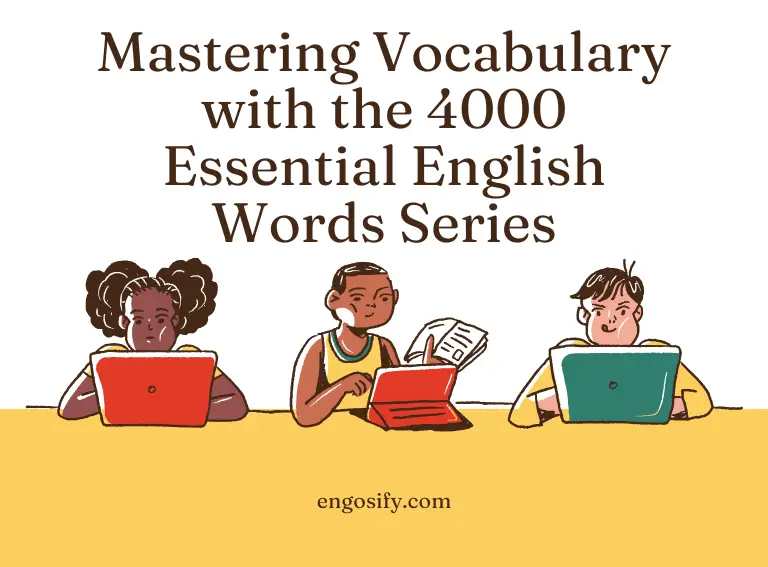Building a solid vocabulary base is one of the most crucial steps in mastering the English language. Whether you’re learning English for school, work, or travel, knowing the right words can make all the difference in how well you speak, read, or understand. One resource that stands out from the crowd is the 4000 Essential English Words series. Designed for learners of all levels, it’s a structured, effective, and easy-to-follow system that has helped thousands boost their vocabulary fast.
In this article, we’ll break down everything you need to know about this powerful vocabulary series—from what it includes and how it’s structured, to strategies for using it and why it’s a must-have for learners around the world. So, let’s dive right in!
What Are the 4000 Essential English Words?
The 4000 Essential English Words is not just another vocabulary list—it’s a complete learning system crafted to help you master the most useful and frequently used English words. Developed by Paul Nation, a world-renowned expert in language learning and vocabulary acquisition, this series is tailor-made for English language learners who want real results.
Each book in the series focuses on high-frequency vocabulary—the kind of words you’re likely to see in books, hear in conversations, or come across in exams like IELTS and TOEFL. That’s what makes this series so effective. It’s practical. It’s relevant. And it works.
What really sets it apart? Well, the words aren’t just thrown at you in a big list. Oh no. They come with definitions, example sentences, short stories, and exercises that actually help you remember and use the words in real life. You won’t just memorize words—you’ll understand and use them.
And yes, it’s ideal for all kinds of learners. Are you a beginner? Great. Starting with Book 1 is like laying the foundation of your English house. More advanced? Books 4, 5, and 6 will challenge you just enough without feeling overwhelming.
What’s more, it’s a self-study-friendly series, so you can go at your own pace. And for those who like to listen and learn, audio files are included. Perfect for when you’re on the go or want to brush up on pronunciation.
So, if you’re serious about growing your English vocabulary, the 4000 Essential English Words might just be your new best friend.
Understanding the 4000 Essential English Words Series
When you first glance at the title 4000 Essential English Words, you might assume it’s just a massive word list. But it’s so much more than that. This six-book series is thoughtfully organized to guide learners step-by-step through a vocabulary journey—from beginner to advanced—with real-world application at every turn.
Who Created the Series?
The mastermind behind this brilliant system is Paul Nation, a respected linguist and vocabulary acquisition specialist. With decades of research under his belt, Nation focused this series on words that actually matter. That means you’re not wasting time on obscure or outdated vocabulary. Instead, you’re learning what you need to understand movies, newspapers, conversations, and standardized tests.
By the way, if you’re curious about the man behind the method, check out Paul Nation’s official page to learn more about his research and other language learning resources.
How Is the Series Structured?
The series consists of six books, and each one contains 30 units. Each unit introduces 20 high-frequency English words, complete with:
- Simple definitions
- Example sentences
- Engaging stories where the words are used in context
- Exercises to test understanding and retention
Altogether, you’ll cover 4,000 of the most useful English words—words that form the backbone of modern English usage.
Books are organized in a progressive manner:
- Book 1 starts with basic vocabulary, perfect for beginners.
- Each following book gradually increases in complexity.
- Book 6 ends with advanced vocabulary geared towards academic and professional contexts.
More Than Just Reading
It doesn’t stop with the printed word. One of the best features of the series is the audio support. Every story and word list is recorded, helping learners develop both pronunciation and listening comprehension. This is especially useful for auditory learners and anyone preparing for listening-based tests like the TOEFL or IELTS.
You can even download the full audio resources from this trusted language learning site, making it super easy to study on the go.
Who Should Use It?
This series is ideal for:
- ESL students at all levels
- Test-takers prepping for IELTS, TOEFL, or other proficiency exams
- English teachers looking for structured vocabulary tools
- Self-learners who want a proven method
The 4000 Essential English Words series doesn’t just help you learn new words—it helps you use them fluently. And that’s the ultimate goal, isn’t it?

Why Choose the 4000 Essential English Words Series?
So, with countless vocabulary resources out there—flashcards, apps, online lists—you might be wondering: What makes this series so special? Why do so many learners (and even teachers!) swear by the 4000 Essential English Words series?
Well, here’s the deal: this isn’t just a bunch of words tossed into a book. It’s a thoughtfully designed learning system—and it works. Let’s break down the key benefits.
It Focuses on High-Frequency Vocabulary
One of the smartest things about this series is its laser focus on the words that matter most. We’re talking about vocabulary that shows up in everyday speech, emails, books, job interviews—you name it. These words form the core of English communication.
You’re not just memorizing for the sake of it. You’re building a foundation that helps you:
- Understand native speakers with ease
- Express yourself clearly and confidently
- Tackle standardized tests like IELTS and TOEFL
A Structured and Systematic Approach
Unlike random word lists that leave you lost and confused, this series takes you by the hand and guides you step by step. The unit-based layout ensures that you digest words in manageable chunks—20 at a time—without feeling overwhelmed.
Each unit includes:
- A short, interesting story with all 20 words in context
- Practice exercises to reinforce your learning
- Review sections to make sure it all sticks
That kind of structure keeps you focused and helps reduce the chances of mental burnout.
Perfect for Exams and Academic Goals
Planning to take the IELTS, TOEFL, or any academic English exam? You’ll need a wide and flexible vocabulary. That’s exactly what this series gives you.
It’s packed with words commonly found in exam reading passages and listening sections. Not to mention, the practice exercises sharpen your critical thinking and comprehension skills, two things test takers desperately need.
Versatile for All Learning Styles
Whether you’re a visual learner, an auditory learner, or someone who needs repetition to remember new words, this series has something for everyone. You can:
- Read the definitions and sample sentences
- Listen to the audio files to fine-tune your pronunciation
- Write your own example sentences or use flashcards for repetition
Even better, there are online flashcard decks available! One awesome resource is this free Anki flashcard deck based on the 4000 Essential English Words—a total lifesaver for anyone looking to memorize more efficiently.
Ideal for Self-Study and the Classroom
Want to study on your own? Go for it. Teaching a class? Perfect. The series is flexible enough to support both self-learners and group instruction. Teachers can even use it as a vocabulary curriculum and build lessons around each unit.
If you’re looking for a clear path to a richer, more fluent vocabulary, the 4000 Essential English Words isn’t just a good choice—it’s a smart investment in your English journey.
Exploring the Six Books in the Series
Now that you know why the 4000 Essential English Words series is a vocabulary powerhouse, let’s dive into the nuts and bolts of each book. Spoiler alert: these books are carefully layered so that every new level builds on what you’ve already learned—just like laying bricks to build a strong house.
Each book contains 30 units, and every unit features 20 essential words, making it super easy to pace yourself and track progress. Let’s break them down one by one.
Book 1: The Foundation for Beginners
If you’re just getting started with English vocabulary, Book 1 is your golden ticket. It introduces basic yet powerful words like afraid, angry, arrive, village, and choice—words you’ll hear in casual conversations and read in beginner-level texts.
- Reading passages are simple but engaging.
- Visual context clues help you understand word meanings easily.
- Ideal for learners at the A1–A2 level on the CEFR scale.
This book lays the groundwork, and trust us, it’s solid.
Book 2: Expanding Your Word Power
Book 2 picks up right where Book 1 leaves off. You’ll encounter slightly more complex words such as adventure, create, frighten, and justice—perfect for learners starting to build confidence.
- Encourages broader comprehension.
- Reading passages become more varied.
- Great for bridging from beginner to intermediate.
If Book 1 was about surviving conversations, Book 2 is about participating.
Book 3: The Sweet Spot for Intermediate Learners
Now we’re getting into the good stuff. Book 3 is a sweet spot where the vocabulary shifts toward academic and real-world usage. Words like benefit, evidence, occur, and quality make frequent appearances in newspapers, workplace discussions, and academic articles.
- Ideal for learners at the B1 level.
- Stories become more detailed and nuanced.
- Perfect for those prepping for IELTS Band 5–6.
This is the book where your vocabulary starts sounding smart.
Book 4: Preparing for Academic Settings
Book 4 introduces vocabulary that you’ll often find in essays, lectures, and professional settings—words like analyze, distribute, impact, and policy.
- Strong focus on academic English.
- More analytical reading passages.
- Exercises get more advanced (but still manageable!).
If you’re heading to university or aiming for Band 6.5+ in IELTS, this is your jam.
Book 5: The Leap to Advanced Vocabulary
Getting serious now? Book 5 contains high-level words that boost your language for professional, academic, and written communication. Words like legislate, mature, primary, and retain are exactly what upper-intermediate learners need.
- Stories mimic journalistic and nonfiction writing styles.
- Units challenge both reading and critical thinking.
- Perfect for the B2+ learner and exam prep warriors.
You’ll feel your vocabulary “muscles” stretching in the best way.
Book 6: The Final Mastery Stage
You’ve come a long way—and Book 6 brings it all together. The vocabulary here is advanced, academic, and used in expert-level content. Expect words like coherent, deduce, inhibit, and reluctant.
- The ultimate prep for IELTS Band 7+, TOEFL 100+, and beyond.
- Exercises build real-world fluency and argumentation skills.
- Reading passages simulate university-level material.
This book isn’t just the end of the series—it’s the beginning of fluency.
Effective Study Strategies Using the 4000 Essential English Words Series
Alright, so you’ve got your hands on the books—great! But here’s the thing: just having the books isn’t enough. To truly make these essential English words part of your everyday language, you’ll need smart strategies that actually work. Let’s explore how to make the most of this powerful series and learn faster, remember longer, and speak more confidently.
1. Set a Realistic Study Goal
Don’t try to rush through the entire book in a week—it’s not a sprint. Think marathon. Aim for one unit per day or every two days, depending on your schedule. That’s 20 new words per session, and it’s totally manageable.
Make it a habit, like brushing your teeth. Same time, same place, daily dose.
Pro tip: Use a planner or digital app like Notion or Trello to track your progress unit by unit.
2. Read the Story First (Without Stressing Over the Words)
Every unit has a short, engaging story that uses all 20 words in context. Before you start studying the definitions, read the story cold—no dictionary, no pausing. Just see what you can understand naturally.
This trains your brain to use context clues, which is exactly how native speakers learn new words.
After you study the definitions, read the story again. You’ll be amazed how much clearer it sounds!
3. Use a Vocabulary Notebook or Digital Notes
Write the word. Define it in your own words. Then, use it in a sentence that relates to your life. Don’t just copy the book’s example—make it personal. That’s how you get the word to stick.
Use tools like:
- Google Docs
- Notion
- A physical notebook
- Evernote
Even better, try Quizlet to make interactive flashcards.
4. Listen to the Audio—Seriously, It Helps
One of the most underrated tools in the series is the audio recordings. Whether you’re commuting, cleaning, or just lying in bed, pop in those earbuds and listen to the word lists and stories.
This:
- Improves pronunciation
- Sharpens listening skills
- Reinforces word retention
Check out this useful free audio download page to grab the files and take your study on the go.

5. Use Spaced Repetition
Don’t just study a word once and forget it. Use spaced repetition, which means reviewing it after one day, three days, a week, and so on. This boosts long-term memory like magic.
Apps like Anki or Memrise are perfect for this. There’s even a pre-made Anki deck for this series, ready to roll.
6. Mix It Up with Activities
Keep things fun! Try:
- Writing a short story using 10–15 of the new words
- Creating doodles or mind maps to visually represent each word
- Practicing role-plays with a friend or language partner
You’ll be amazed at how much faster you own the vocabulary when you’re using it creatively.
7. Combine with Real-World English Practice
Once you’ve learned new words, go out and spot them in the wild. Watch English shows, read articles, or scroll through English news websites like BBC Learning English to reinforce what you’ve studied.
You might catch yourself thinking, “Hey! I just learned that word yesterday!”
In short, don’t just read the 4000 Essential English Words—live them. With the right study habits, this series can become your secret weapon for fluent, confident English.
How the Series Helps in Standardized English Tests Like IELTS and TOEFL
If you’re aiming to crush your IELTS, TOEFL, or other English proficiency exams, then you’re probably drowning in practice tests, grammar guides, and maybe even YouTube videos. But here’s a little secret: mastering the 4000 Essential English Words can make everything easier.
Why? Because vocabulary is the backbone of these exams. You need to understand it in reading, hear it in listening, use it in writing, and pronounce it correctly in speaking. Let’s explore exactly how this series supports each section of standardized English tests.
Reading Section: Spotting Keywords Like a Pro
Test passages in IELTS and TOEFL are packed with academic vocabulary, and guess what? A huge chunk of that vocab comes straight from this series.
When you’ve studied words like analyze, assume, function, or significant, you’re better equipped to:
- Scan and skim faster
- Identify synonyms in tricky questions
- Understand complex sentence structures
- Avoid getting tripped up by unfamiliar terms

This is where the structured learning in the series pays off—you’re no longer “translating,” you’re understanding.
Listening Section: Recognizing Words in Real-Time
Listening can be tough, especially with accents and speed. But the series’ audio files train your ear to recognize natural speech patterns, intonation, and—most importantly—vocabulary.
With practice, you’ll start picking up:
- Common academic terms during lectures
- Conversation fillers and transition words
- Keyword cues for multiple-choice or short-answer questions
By the time you sit for the exam, your brain won’t freeze when you hear words like lecture, require, or contrast. You’ll already know them.
Writing Section: Using Precise and Academic Words
Want to impress examiners? Then ditch the basic words like good, bad, nice, and thing. The 4000 Essential English Words offers stronger choices like:
- Effective instead of “good”
- Challenge instead of “problem”
- Evaluate instead of “look at”
These are the kinds of words that boost your Task Achievement and Lexical Resource scores on IELTS and TOEFL writing sections. Not only do you sound more professional, but you also avoid repetition and demonstrate range—two things examiners love.
Speaking Section: Sound Natural and Fluent
When you’re in the speaking room, nerves can hit hard. But a well-equipped vocabulary gives you something solid to fall back on.
This series helps you:
- Replace fillers (“uhh,” “umm”) with confident words
- Use a broader range of expressions
- Answer questions more naturally with storytelling vocabulary
For instance, instead of saying “I like books,” you might say, “I’m fascinated by historical fiction because it allows me to explore different cultures and time periods.” That’s the kind of language that turns heads in a speaking test!
Direct Vocabulary Crossover With Real Exam Material
Many of the words in the 4000 Essential English Words series are pulled from corpus-based research—which means they appear frequently in real-life academic and test contexts. So, this isn’t guesswork. It’s strategy.
And if you’re practicing with official TOEFL or IELTS guides, chances are you’ll spot tons of overlap. That’s not coincidence—it’s design.
Real-Life Applications and Success Stories
Alright, we’ve covered how the 4000 Essential English Words series can transform your vocabulary, prep you for exams, and even fine-tune your listening and writing. But let’s get real—what does success actually look like? How does this series show up in everyday life, jobs, classrooms, and international journeys?
In this section, we’ll explore real-life ways learners have used these books to upgrade their English—and change their lives in the process.
Speaking English with Confidence While Traveling
Meet Amal from Morocco. She started learning English for travel purposes, beginning with Book 1 and slowly moving up. After just six months of consistent practice, she was able to confidently ask for directions, order food, and even hold conversations with fellow travelers across Europe.
Her words?
“When I saw words like ‘advice,’ ‘baggage,’ and ‘guide’ in the airport signs—I smiled. They weren’t just words anymore. They were mine.”
This is where real learning shows up—not just in the test scores but in moments that matter.
Succeeding in International Job Markets
Carlos from Brazil had one big goal: land a remote job with an international tech company. His speaking was okay, but his writing felt weak and basic. So, he dove into Books 4 through 6, focusing on academic and professional terms.
He practiced with spaced repetition, journaled daily using target words like analyze, propose, strategy, and even used them in mock interviews.
A few months later, he landed a job—and now uses English daily in emails, video calls, and reports.
Real-world vocab makes real job success possible.
Mastering English in the Classroom
Aisha, a university student in Malaysia, struggled with academic reading. Her textbooks were filled with confusing terms, and her essay scores were slipping. Her English professor recommended the 4000 Essential English Words series, especially Books 3 through 5.
After building her vocabulary with words like concept, interpret, theory, and assume, her reading speed and comprehension soared. Her essays started to sparkle with clarity and precision.
Learning 20 words a week gave her an edge—not just in English class, but in all her subjects.
Everyday Communication: No More Blank Stares
One common win that learners across the globe mention? No more “blank stares” when watching English YouTube videos, TV shows, or movies. Understanding the meaning behind phrases and hearing familiar words in dialogue turns English from a scary subject into something enjoyable—even fun.
Words like genuine, issue, ignore, and response pop up everywhere. And once they’re part of your vocabulary toolkit, you start thinking in English, not just translating.
FAQs
You’ve seen how powerful the 4000 Essential English Words series can be—but chances are, you still have a few questions buzzing in your head. You’re not alone. Learners from all over the world often ask the same things before diving in.
Let’s tackle the most frequently asked questions to clear things up and help you get the most out of your vocabulary journey.
What is the 4000 Essential English Words series?
It’s a six-book series written by Paul Nation, a renowned linguist and vocabulary acquisition expert. The books are carefully structured to teach high-frequency and academic vocabulary using stories, definitions, and practice exercises.
Each book:
- Introduces 600–800 new words
- Organizes words into 30 units
- Includes stories that use all 20 target words per unit
- Reinforces meaning through repetition and context
It’s designed to build your vocabulary step by step, from beginner to advanced.
How many books are in the series?
There are six books in total. Each one builds on the previous, gradually increasing in difficulty. Here’s a quick breakdown:
- 📗 Book 1: Beginner (A2 level)
- 📘 Book 2: Pre-intermediate (B1)
- 📙 Book 3: Intermediate (B1–B2)
- 📕 Book 4: Upper-intermediate (B2)
- 📔 Book 5: Advanced (C1)
- 📓 Book 6: Academic/Professional (C1+)
Start where you feel comfortable, then move up gradually. Don’t rush it—mastery comes with consistency.
Are these books good for self-study?
Absolutely, yes! The series is perfect for independent learners. Every unit is bite-sized, intuitive, and comes with enough context to make learning effective without a teacher. You can:
- Learn at your own pace
- Use the free audio files
- Reinforce words with the built-in exercises
- Track your progress through simple reviews
And with support tools like Anki or Quizlet, you can create a complete vocabulary immersion experience.
Can it help improve my speaking and writing?
100%. These books aren’t just for passive learning—they prepare you to use English actively. Learners often report improved fluency and writing clarity after a few months of consistent use.
Here’s how:
- Speaking: Words become part of your daily speech through stories and repetition
- Writing: You learn more accurate and formal vocabulary for essays, reports, and emails
Words like consider, respond, propose, and achieve are just a few examples of how your communication becomes more precise and confident.
Is this series enough to learn English?
Not entirely. Think of it as your vocabulary backbone, not a full-body workout. You’ll still need to:
- Practice listening and speaking
- Engage with real-life content (news, podcasts, etc.)
- Study grammar and sentence structure
- Join conversations, write journals, or take classes
But if you’re building your English foundation, these books are one of the best tools out there to get started strong.
Where can I get the 4000 Essential English Words for free?
You can find legal free PDFs and audio files online via educational platforms like:
- IELTS Practice Online – Audio & PDF Downloads
- BBC Learning English (for additional vocabulary practice and usage)
- Quizlet Flashcards (search for shared decks on each book)
Conclusion
Mastering English isn’t just about knowing a bunch of words—it’s about knowing the right words, the ones that actually show up in everyday conversations, academic settings, job interviews, and international exams. That’s exactly what makes the 4000 Essential English Words series so powerful.
From its smart structure to its practical stories and engaging exercises, this series takes you from the basics to advanced vocabulary without overwhelming you. Whether you’re prepping for the IELTS, TOEFL, or just want to sound smarter and more confident in English, these books give you the tools to get there—one word at a time.
So, if you’re tired of forgetting new words or feeling stuck at the same English level, it’s time to level up your learning. Pick up that first book, commit to consistent practice, and unlock a world of English you never thought possible.
Because when you build a strong vocabulary, you’re not just learning English—you’re opening doors to global opportunities.

